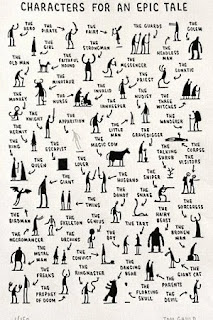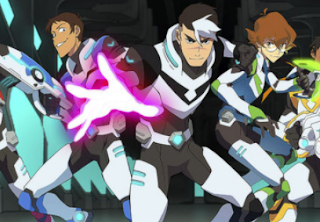Troublesome Character Tropes - Tray
Character tropes, referring “to a common motif or pattern in a work of art” according to www.masterclass.com, can be a valuable asset to a story when used in refreshing, ironic, or criticizing ways. However, when written incorrectly, these motifs can be cliché or even boring. Tropes aren’t exclusive to books and can be applied to other media like TV shows or movies. Some of the tropes I will be covering today might not strictly fit into the definition of a “character trope”, but they all have the ability to leave an unpleasant taste in your mouth.
Perished Parent(s)
After reading a modest selection of children/young adult books, you start to notice some patterns in the set-ups, like the fact that ap-parent-ly every children/young adult book has to contain an orphaned protagonist or a single guardian working 14 hours a day to support their kiddo. It’s a staple at this point. I suppose it adds some sympathy for the main character, but after a while you can start to wonder why these authors just keep killing these poor adults. Maybe the parents are the reason the protagonist sets out on the journey, which is an actual reason for them to be dead. Maybe the trauma of the car accident that the parents died in “deepens” the mc’s personality, even though being an orphan is not a personality trait. Or maybe it’s a last minute thing slapped onto the characters because it’s “cool”.
Minority Bestie
While having a minority member in the main cast is definitely a step in the right direction, the one thing that bugs me is the fact that certain minority communities seem to be more “popular” than others. Where are the trans people? Muslims? Non-binaries? I’m not saying that African Americans, East Asians, or gay people shouldn’t be represented at all, it’s just the fact that other minority communities rarely even get casted as that random person who has 2 lines. You might argue that there’s only a small portion of the population who are these minorities or that this train of thought might lead to tokenism instead of honest representation, which is a huge argument all on its own, but I’m not going to get into all that in this blog.
There’s another thing that’s a bit questionable about the minority bestie, and that’s the stereotypes. Of course, there are stereotypes for everything, not only the best friend or minorities, but I find that the minority best friend figure fulfills these stereotypes very often. There are many, many stereotypes for the “minority bestie”, for example, the sassy black friend or the Asian mathlete, but that’s all they are: stereotypes. Some shows don’t bother going any deeper than that, which is sometimes fine, but I wish the personality of the character was a little more 3D.
Queerbaitin’ Duo
According to Wikipedia, queerbaiting “is a marketing technique for fiction and entertainment in which creators hint at, but then do not actually depict, same-sex romance or other LGBTQ representation.” Even if the relationship is paired together/promised, it’s not uncommon for one of the partners to just . . . kinda die. This trope is less of a character thing and more of a business practice, and is more prominent in TV shows than books.
Why is queerbaiting problematic? Creators are starting to realize that there are more queer people out there than initially realized. You would think that this would be a good thing, since now they can properly represent LGBT people in their shows, right? Apparently not. Instead of featuring clearly queer characters, they just kind of keep everything ambiguous, but never intend to actually have any of the gay™ on their shows.
Why do people do this? Creators usually do this to attract queer people to watch their shows, but also not drive their mainly straight audience away. Pretty ridiculous, if you think about it. Queerbaiting isn’t exclusive to same sex relationships and can be applied to other types of queer people as well.
A lot of femme fatals’ personalities are skin deep, literally. When pulled off correctly, this trope can give off the swashbuckling vibe that the authors were going for, but it can be pretty difficult to pull off without the girl just being “oh yes I will seduce you now cool.” Femme fatals also bring up the problem of how, in a lot of books, woman can only win battles using seduction. Using one’s femininity isn’t a bad thing, but why can’t some girl just stab someone instead of “fluttering her eyelashes flirtatiously”.
Misinterpreted Mental Illness
Kind of explains itself, doesn't it.
The two most common mental illnesses that I see misrepresented are DID, dissociative identity disorder, and OCD. Of course, there are some extremely well written novels/shows with accurate portrayals of these illnesses, but most of the interpretations I read are questionable at best, and harmful at worst.
OCD is often portrayed as a funny little quirk and is used as comic relief. Things like cleaning, symmetry, and tapping doors are either played up to a comical level, or left in the back until the next funny moment needs the disorder. On the other hand, DID is often used as an edgy dark side to a character. In fact, just the other day, I was reading an online comic and the main character turned out to be a murderer, but she wasn’t aware of it because of her split personalities.
Both of these interpretations are inaccurate, as OCD is a mental illness that can cause a lot of stress to someone and shouldn’t be treated lightly, and just because someone has an alternate personality doesn’t mean they’re a murderer in disguise.
Now that you’ve read this blog, you’re armed and ready to see these problematic tropes in the wilderness. Congratulations for making it through.





This is a very rounded and relatable post. A few of these tropes I knew to be common, but others I didn't realize to be as common. I can definitely remember seeing a couple instances of these in books, movies, and TV shows I've read/watched. Also, a moment of silence for all of the dead parents slapped onto characters to make us ignore a few bland parts of their personalities and sympathize with them lol.
ReplyDeleteI do like thinking about tropes a lot, especially the ones that are kind of eh. But the ones you brought up in this post are some that I don't think about as much, especially the Femme Fatal trope and the Misinterpreted Mental Illness trope. When writing about someone with a Mental illness or some medical condition I think it's pretty important to be as accurate as possible and you brought up good points about how different portrayals can be harmful.
ReplyDelete